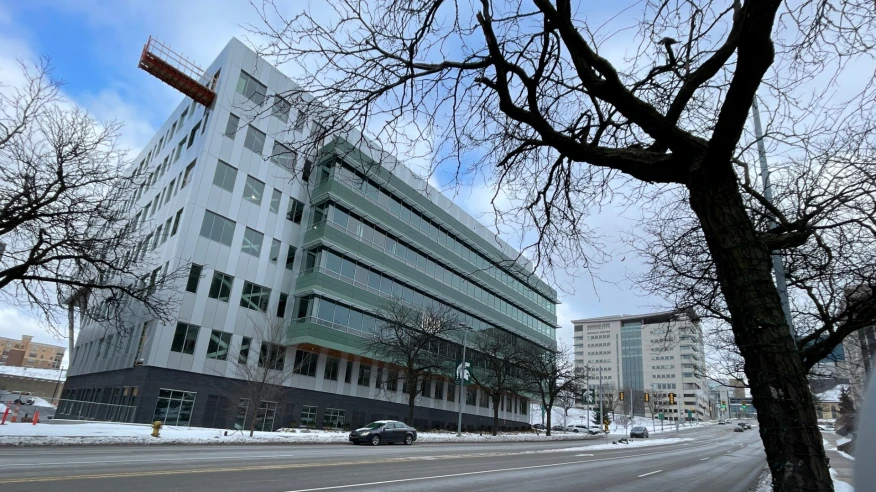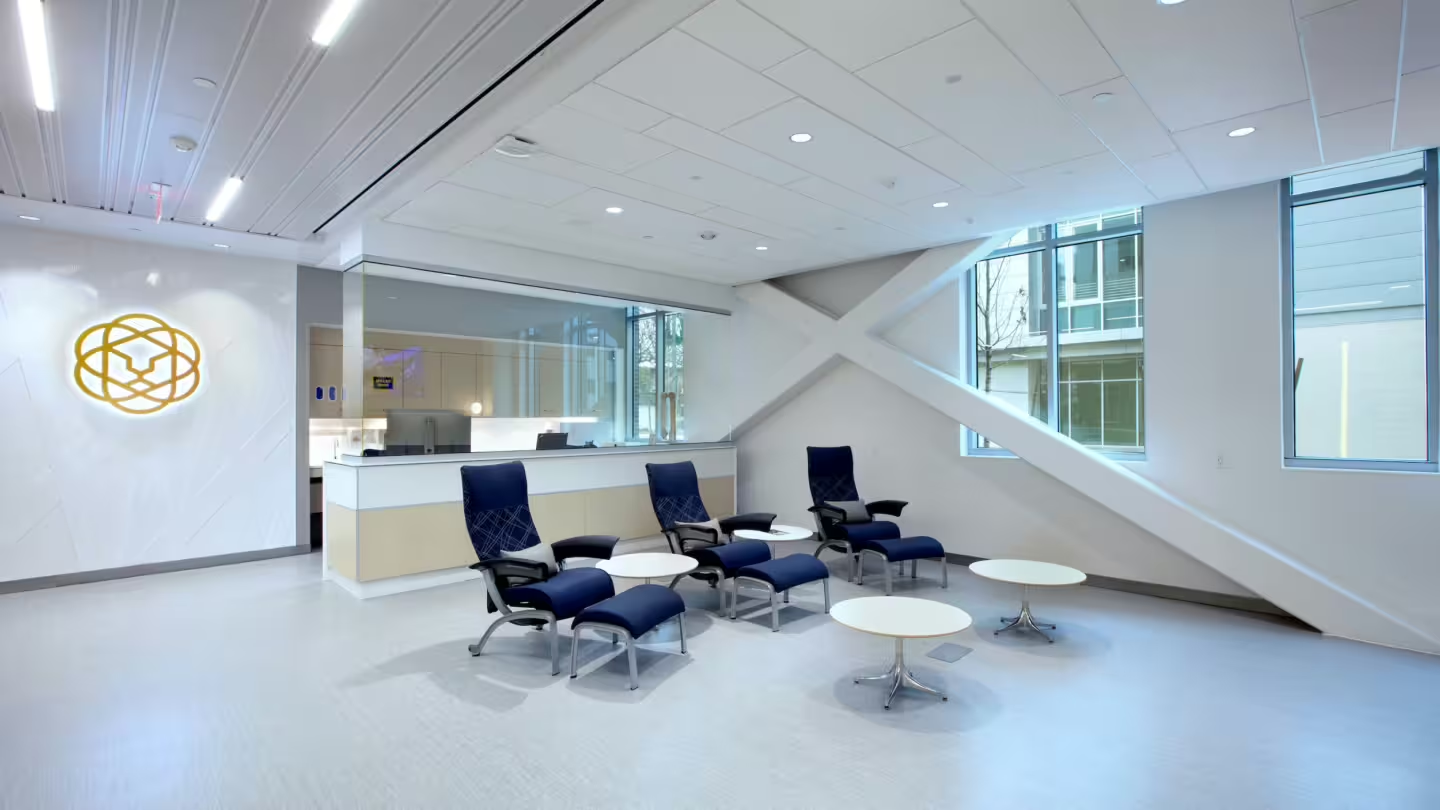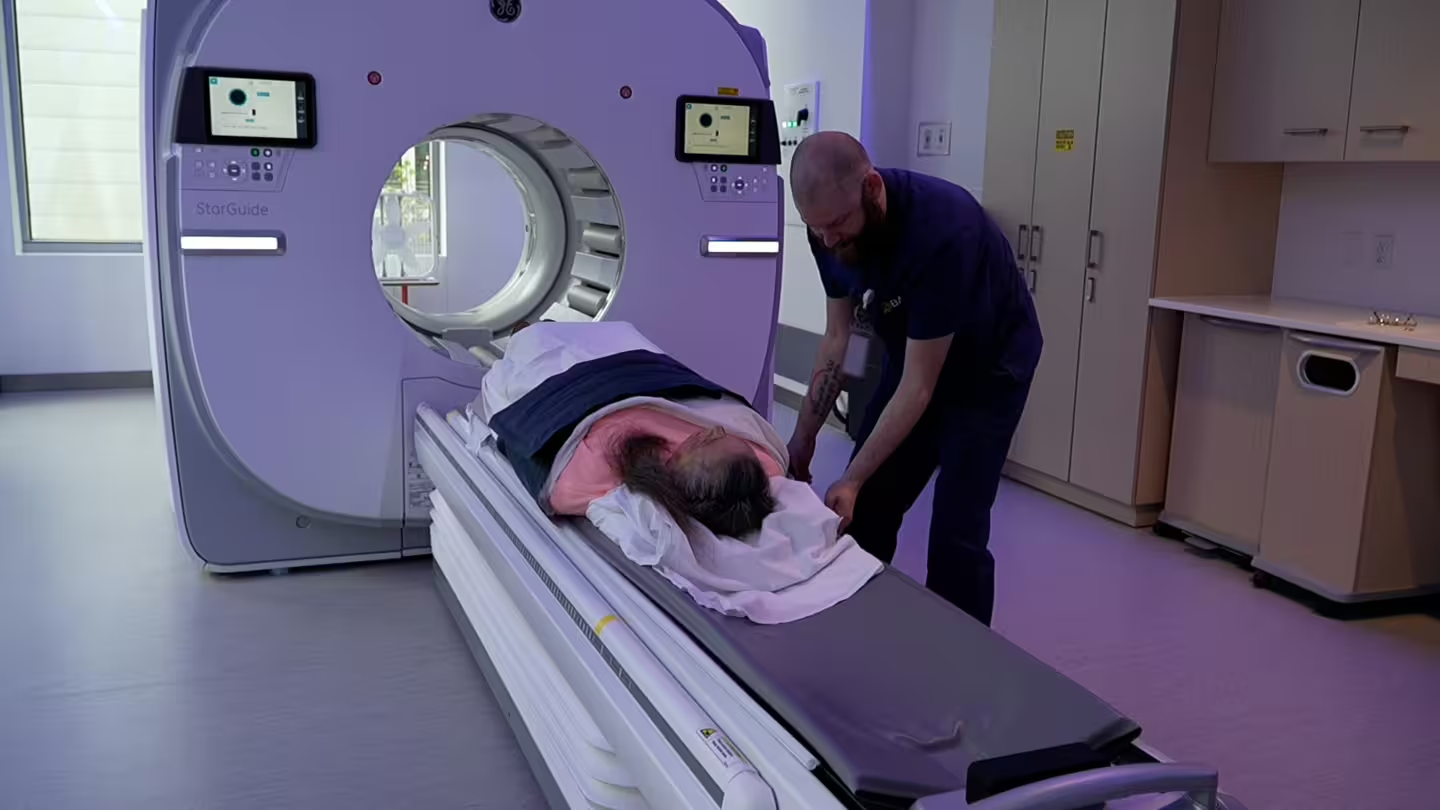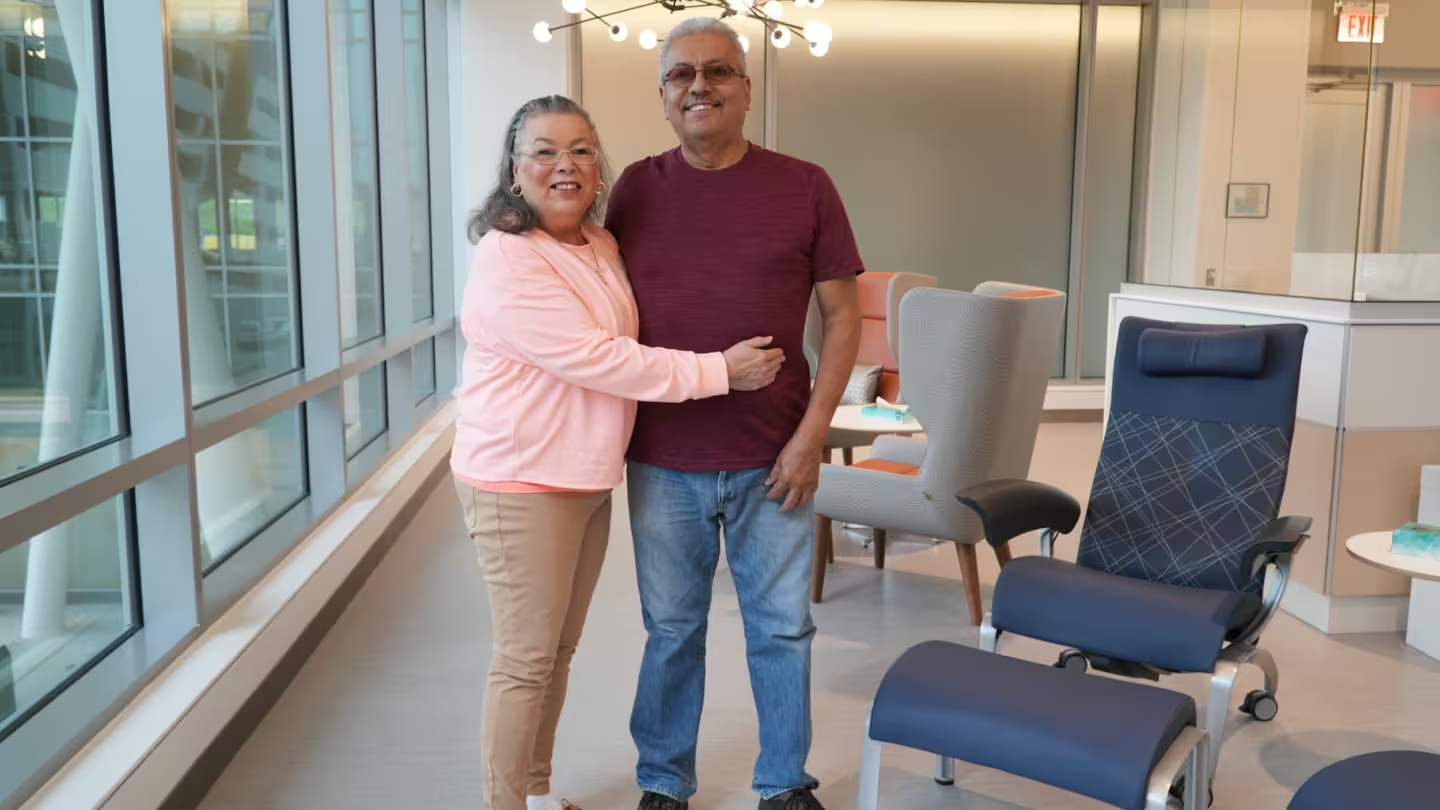
Originally posted by WoodTV by Christa Ferguson
GRAND RAPIDS, Mich. (WOOD) — In a move out of the movie “Field of Dreams,” BAMF Health is building an unprecedented home in Grand Rapids for disease breakthroughs that are expected to come.
Founder Anthony Chang says using radiopharmaceuticals to identify and destroy cancer and other diseases within hours was considered the future of medicine at an international meeting a decade ago.
“Ten years later, it’s still the future. And then I start to sit down to think about why, and the reason is we don’t have this kind of infrastructures. And it’s not as simple as that. Building these kind of infrastructures, it’s basically a blank canvas and nobody really know what needs to be done. It’s extremely, extremely complicated because you also need to solve regulatory issues together,” Chang explained.
Fueled by frustration that lifesaving technology wasn’t reaching the patients who need it, Chang left his tenured job in medical research to build BAMF Health.
Chang said the founding team of BAMF Health started exploring the idea for the radiopharmacy, molecular imaging and theranostics clinics in 2006. In 2018, BAMF Health began reaching out to the philanthropic community including Doug Meijer, the Meijer Foundation and Michigan State University to help bring the company’s $50 million investment and vision to fruition.
“We think the Innovation Park is the most ideal location for this new technology. We can leverage the research capability with MSU just right next to (us)…and also we can leverage.. the educational resource and patients resource from the Medical Mile,” Chang said.
A RADIOPHARMACY UNLIKE ANY OTHER
BAMF Health’s radiopharmacy is already up and running inside the $90 million Doug Meijer Medical Innovation Building.
“This is a brand-new design of a radiopharmacy. Nobody on earth has done this before,” he said.
Chang and his team gave News 8 an exclusive tour inside the facility last month as New Community Transformation Fund announced its first $500,000 investment in BAMF Health.
BAMF Health’s first-floor radiopharmacy is home to two cyclotrons, each surrounded by 6 feet of concrete to protect team members and visitors from radiation. Dozens of Geiger counters hang throughout the space at every exit, monitoring radiation levels. The team must also check in electronically before entering the radiopharmacy and scan their hands and feet for radiation when leaving.
BAMF Health’s cyclotrons each have their own vault, allowing the team to take one offline when needed without stopping the time-sensitive radioisotope production needed for patient diagnosis and treatment.
“As soon as they’re created, they start to decay. Some of them have half-lifes as short as two or even 10 minutes. So it’s vital that we have the on-site manufacturing adjacent to the clinics,” said Chad Bassett, chief operating officer for BAMF Health.
After an isotope is produced, it moves from the cyclotron down a lead brick-shielded line in the floor to a hot cell in the radiopharmacy, where a robot combines the radioisotope with its carrier using a chemical reaction triggered through an automated system. The finished radiopharmaceutical is then sent back through the covered line to a sterile dispensing hot cell.
Chang says his team earned approval from the Nuclear Regulatory Commission and produced the first batch of clinical graded drugs in record time.
“We worked with state Sen. Winnie Brinks and other local representatives, senators and ultimately passed one of the fastest CON (certificate of need) bills in Michigan history that enabled us to bring this lifesaving technology right here to Grand Rapids,” Bassett said.
INSIDE THE CLINICS
When it comes to designing BAMF Health’s outpatient clinics, the team is keeping in mind the patient’s journey to their front door.
“Most of our patients coming in will be Stage Four starting out and some of them will be on hospice care as well. So we understand that from a mental mindset perspective, the need to really make sure that we’re thinking of the full mind, body, spirit,” said Laurie Placinski, vice president of design, real estate and partnerships for BAMF Health. “It’s not just about treating the disease, it’s about treating and caring for the full patient.”
Chang said the series of large columns at BAMF Health’s entrance are meant in part to bring patients a sense of empowerment.
“We want make sure patients understand that when they come over here, everybody work(ing) in this building is fighting for them, fighting with them,” Chang said.
All of the columns come in from different directions and none are perfectly perpendicular to the ground. Chang says the design symbolizes the teamwork needed from different experts to harness the new technology found at BAMF Health.
“We can support big things to make big things happen. It’s all about teamwork,” he said.
Two stories of glass flood the lobby with natural light. The entryway also features warm wood finishes aimed at bringing patients closer to nature and further away from any expectation of a cold treatment facility.
Lead shielding is built into the drywall of each patient room in the first-floor molecular imaging clinic, allowing people outside each room to safely pass without fear of radiation. Chang says the team also developed computer-controlled, color-coded LED light panels outside each room to indicate when a patient is inside and whether they’ve been treated with a radiopharmaceutical.
Chang says when the molecular imaging clinic is up and running, it will be able to scan about 130 patients a day, thanks in part to the nation’s first clinical use whole-body positron emission tomography scanner.
“This PET is about 40 times… more sensitive than any other PET on Earth. So it will allow us to significantly decrease the radiation dose we need to inject into the patient and also we can shorten the scanning time from 40 minutes to one minute,” Chang said, adding that it’ll open a new field of treatment for pediatric patients.
BAMF Health will also house Michigan’s first PET/MR scanner “and it will be the most advanced one in the world,” Chang said. The room where it’s housed is also shielded in metal to block the magnetic field.
The second floor theranostics clinic will be home to a next generation high resolution digital SPECT/CT.
Construction on BAMF Health’s first-floor diagnostic imaging clinic and second-floor theranostic clinic started in August. Contractors are finishing work on the walls but have left open portions of the building for the next milestone — installing the PET scanners, which Chang expects to happen in late April or early May.
Construction is also ongoing on BAMF Health’s headquarters on the building’s seventh floor. Chang says it will feature flexible work spaces for up to 300 team members as well as a meditation/nap room, staff gym, showers, cafeteria and professional kitchen.
Collaborative groups are expected to move into the other floors of the Meijer Medical Innovation Building, including an MSU data and research team. Chang said an artificial intelligence company may also join the mix.
BAMF Health’s seventh-floor headquarters also feature a unique space for its flagship site: a design lab to test new concepts for BAMF Health’s facilities and patient rooms.
“If this is good… we are going to start to expand to our other sites of the nation. And if it’s not, they will come to demolish it and redesign the whole thing. So we’re going to keep improving, keeping innovating until we find the optimized solution, the best for the patients,” Chang said.
BAMF Health is working with Steelcase and Custer to build out its headquarters. It’s also tapped Herman Miller and TRELLIS for designing its clinical spaces with extra safety measures in mind, like lead sheeting and leaded glass.
Walker-based Angstrom Technology also designed and installed the cleanroom at BAMF Health.
BAMF Health’s diagnosis method was approved by the Food and Drug Administration more than a year ago, Chang says. The treatment has earned FDA approval as a breakthrough therapy for neuroendocrine tumors and Chang expects the treatment to be approved for prostate cancer “any day now.”
BAMF Health expects to break ground on two other clinics this year, including one at California’s Loma Linda University. Bassett says they expect to build 10 to 20 of these facilities within three years, in partnership with top-notch academic medical centers and hospital systems. He said the network of clinics will speed up clinical studies, with a goal of bringing the drug development and approval process from 10 years down to two or three years.
“So this is just the start,” Bassett said. “We built an incredible foundation, an incredible footprint, but everything we do is designed to ultimately make this affordable and accessible to everyone who needs it regardless of their background, regardless of their income status. That’s something that we work hard and think about every single day.”
Bassett said BAMF Health plans to work with insurance providers including Medicaid to show them how same day diagnosis and treatment can potentially eliminate hundreds of thousands of dollars in costs.
“But more importantly, we can eliminate a soft cost… eliminating that mental cost of agony over, ‘When am I going to be treated? What are my results?’ We will provide information to patients as soon as possible. But also the cost of caregivers of people who are taken out of their daily lives by some of these terrible drugs or terrible treatments,” he said. “Also, helping people get back to their jobs as soon as possible. The amazing part of this treatment is the lack of, or really decreased side effects. So people can come back to their jobs, come back to their daily lives. In some cases, the next day or two or three days after treatment.”
Chang says he has “very complicated mixed feelings” about getting to this point, but most of all he’s grateful.
“This has never been a dream, this is the things that need to be done. And we know this is a very, very hard job and the whole world, nobody is really willing to tackle this. So I’m really extremely proud of our Grand Rapids community support it and make this happen,” he said.


